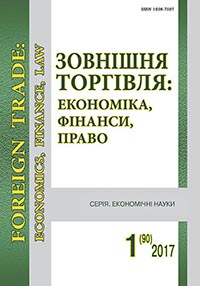Budget strategy for socio-economic development of the country
Keywords:
budget, budget system, fiscal policy, budgetary tactic, budget strategyAbstract
Background. Modern financial science focuses on the study of the impact of institutional and macroeconomic factors on fiscal policy, which should consider the appropriate institutional conditions of the development of cyclical nature of social and economic processes. In methodological as well as in scientific and practical terms insufficiently studied issues remain, arising from understanding of institutional changes in the budget area that occur as a result of the financial and economic transformations, and application of new approaches that would ensure the quality of budget strategy formation and implementation.
The analysis of recent researches and publications on the selected subject indicates that the budget strategy takes an important place in the system of state regulation. The efficiency and effectiveness of the budget strategy is an essential prerequisite for the provision of fiscal sustainability and stability that contributes to the formation of basic conditions for economic growth of the country, investment development and competitiveness of the economy. Effective fiscal strategy is one of the main conditions for obtaining a high investment rating as an important precondition for sustainable economic growth. The main components of the budget strategy should be the mutually agreed with all components of financial policy as well as with foreign economic policy of the country, the formation of budget policy should be based on the assessment of exogenous and endogenous factors that will ensure its efficiency and effectiveness.
The aim of the article is the disclosure of economic substance and determination of the tasks of budget strategy as a tool of social and economic development of the country.
Materials and methods. Systemic and structural methods are used in the disclosure of the economic substance of the budgetary strategy as a tool of social and economic development of the country, methods of scientific abstraction and synthesis are used in the disclosure of the priority tasks of the budget strategy.
Results. A significant achievement of the conducted research is the disclosure of the economic substance of the budgetary strategy as a tool of social and economic development of the country, determination of the functions and tasks of budgetary strategy, justification of the principles of strategic budgeting: reasonableness; efficiency; consistency; adaptability; variability; coherence; purposefulness; sociality; legitimacy; innovativeness.
Conclusion. In modern society, the budgetary strategy is a complex, multidimensional and multifaceted tool of the provision of sustainable economic development and social stability, which reflects the compromise in correlation of social and economic interests of fiscal relations participants. The economic essence of the budgetary strategy is to use the systems of financial and economic measures which are implemented by public and local authorities in multidimensional terms: budget transformations, configuration of fiscal institutions, social and economic transformations.
The conducted research will deepen the understanding of the role of the budget strategy as a tool of social and economic development of the country, will provide an opportunity to increase the quality of the functioning of public finances system.
References
B’jukenen Dzh. M., Masgrejv R. A. Suspil’ni finansy i suspil’nyj vybir: dva protylezhnyh bachennja derzhavy ; per. z angl. A. Ishhenka. Kyi’v : KyjevoMogyljans’ka akademija, 2004. 175 s.
Kejns Dzh. M. Obshhaja teorija zanjatosti, procenta i deneg ; per. s angl. M. : Gelios, 2012. 352 s.
Samujel’son P. Je., Nordhaus V. D. Jekonomika ; per. s angl. 18-e izd. M. : Vil’jams, 2010. 1360 s.
Speranskij M. M. Plan finansov. U istokov finansovogo prava. M. : Statut, 1998. T. 1. S. 17–106.
Stiglic Dzh. Ekonomika derzhavnogo sektora ; per. z angl. A. Olijnyka, R. Skil’s’kogo. Kyi’v : Osnovy, 1998. 854 s.
Zapatrina I. V., Lebeda T. B. Bjudzhetna polityka stymuljuvannja ekonomichnogo zrostannja ta mehanizmy i’i’ realizacii’. Finansy Ukrai’ny. 2006. № 4. S. 38–45.
Vasylyk O. D. Teorija finansiv. Kyi’v : NIOS, 2000. 416 s.
Lysjak L. V. Bjudzhetna polityka u systemi derzhavnogo reguljuvannja social’noekonomichnogo rozvytku Ukrai’ny. Kyi’v : DNNU AFU, 2009. 600 s.
Mazaraki A. A., Mel’nyk T. M. Innovacii’ jak dzherelo strategichnyh konkurentnyh perevag. Visn. Kyi’v. nac. torg.-ekon. un-tu. 2010. № 2. S. 5–17.
Oparin V. M., Fedosov V. M., Juhymenko P. I. Ukrai’ns’ka klasychna shkola publichnyh finansiv. Finansy Ukrai’ny. 2015. № 10. S. 7–31.
Fedosov V. M. Bjudzhetnaja politika ES. Finansy. 2009. № 7. S. 66–67.
Chugunov I. Ja. Dovgostrokova bjudzhetna strategija u systemi ekonomichnoi’ cyklichnosti. Visn. Kyi’v. nac. torg.-ekon. un-tu. 2014. № 5. S. 64–77.
Chugunov I. Ja., Makogon V. D. Bjudzhetno-podatkova polityka v umovah instytucijnyh peretvoren’. Visn. Kyi’v. nac. torg.-ekon. un-tu. 2014. № 4. S. 79–91.
Zhiharevich B. S. Prioritety regional’noj politiki segodnja: evropejskaja i ros-sijskaja praktika. Vybor strategicheskih prioritetov regional’nogo razvitija: novye teoretikometodologicheskie podhody / pod obshh. red. V. V. Okrepilova. SPb : Nauka, 2008. 240 s.
Mincberg G., Al’strand B., Lampel’ Zh. Strategicheskoe safari : jekskursija po debrjam strategicheskogo menedzhmenta ; per. s angl. D. Raevskoj, L. Caruk. M. : Skolkovo, Al’pina pablisher, 2013. 366 c.
Kistanov V. V. Regional’naja jekonomika. M. : Finansy i statistika, 2009. 586 s.
Chugunov I. Ja. ta in. Derzhavne finansove reguljuvannja ekonomichnyh peretvoren’. Kyi’v : Kyi’v. nac. torg.-ekon. un-t, 2015. 376 s.



